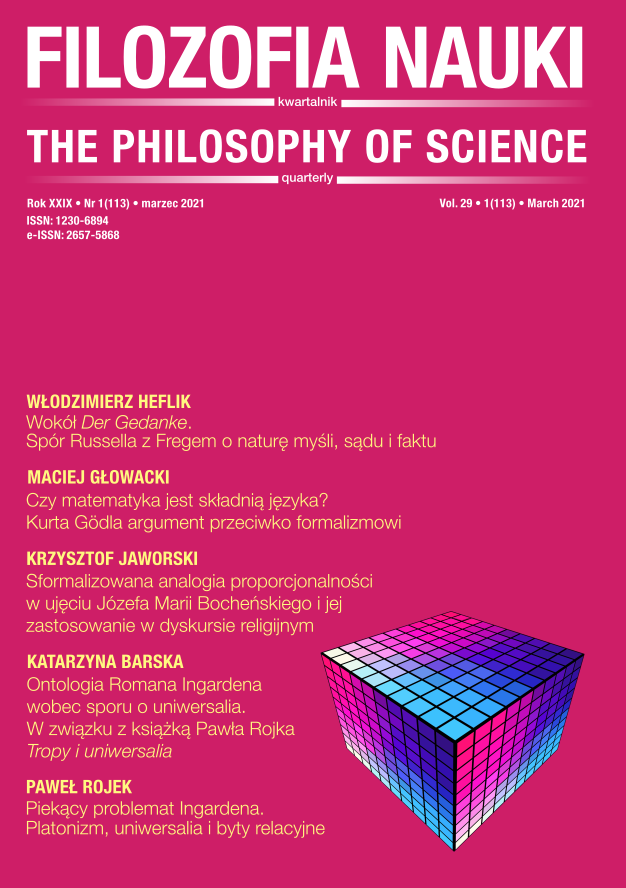Józef Maria Bocheński’s Formalized Analogy of Proportionality and Its Application in Religious Discourse
DOI:
https://doi.org/10.14394/filnau.2021.0006Keywords:
analogy, religious discourse, isomorphism, negative theology, positive theologyAbstract
The article presents a formal scheme of the analogy of proportionality formulated by Józef Maria Bocheński. Bocheński applies his theory to religious discourse in order to claim that the meaning of this discourse does not have to be established exclusively in a negative way, in opposition to the claims made by negative theology. The aim of this article is to show that the application of analogy to religious discourse does not work. Bocheński’s theory is criticized in three aspects.
Firstly, by adopting the assumptions of the theory of analogy, one can easily prove that some relations considered within religious discourse are indistinguishable, thus leading to confusion. Secondly, analogy as utilized by Bocheński takes only the formal properties of relations into account, making religious discourse almost materially empty. Thirdly, any attempt to treat analogy as an isomorphism of relations results in difficulties with defining the domains of these relations. The conclusion emphasizes one more fact: the analogy of proportionality offered by Bocheński and applied to religious discourse is simply impractical and useless since nobody uses it.
References
Bocheński J. M. (1948), Wstęp do teorii analogii, „Roczniki Filozoficzne” 1, 64-82.
Bocheński I. (1949), O metodzie teologii w świetle logiki współczesnej, „Collectanea Theologica” 21(2-3), 171-192.
Bocheński J. M. (1956), Gedanken zur mathematisch-logischen Analyse der Analogie, „Studium Generale” 9, 121-125.
Bocheński J. M. (1990), Logika religii, tłum. S. Magala, Warszawa: PAX.
Bocheński J. M. (1993), O analogii [w:] Logika i filozofia. Wybór pism, Warszawa: Wydawnictwo Naukowe PWN, 50-78.
Borkowski L. (1991), Wprowadzenie do logiki i teorii mnogości, Lublin: TN KUL.
Buda S. (2006), Dynamika analogii, „Zagadnienia Filozoficzne w Nauce” 38, 127-141.
Emmet D. (1961), The Nature of Metaphysical Thinking, London: Macmillan.
Herbut J. (1963), O formalnym ujęciu analogii transcendentalnej, „Roczniki Filozoficzne” 11, 25-40.
Jaworski K. (2017), Antynomia kłamcy a teoria hiperzbiorów, „Studia Paradyskie” 27, 187-206.
Katechizm Kościoła Katolickiego (1994), Poznań: Pallottinum.
Kuratowski K., Mostowski A. (1978), Teoria mnogości, Warszawa: Państwowe Wydawnictwo Naukowe.
Linsky B., Andrew D. I. (2021), Principia Mathematica [w:] The Stanford Encyclopedia of Philosophy (Fall 2021 Edition), https://stanford.io/3mUBVfG.
Menne A. (1959), Was ist Analogie?, „Philosophisches Jahrbuch” 67, 389-395.
Moskal P. (1996), Problem użyteczności logiki współczesnej w uprawianiu metafizyki. Uwagi metafizyka, „Łódzkie Studia Teologiczne” 5, 133-144.
Moskal P. (1997), Ograniczenia Józefa M. Bocheńskiego OP analitycznej eksplanacji religii, „Łódzkie Studia Teologiczne” 6, 99-139.
Pouivet R. (2013), Bocheński on Divine Ineffability, „Studies in East European Thought” 65(1-2), 43-51. https://doi.org/10.1007/s11212-013-9183-9
Rojek P. (2010), Towards a Logic of Negative Theology [w:] Logic in Religious Discourse, A. Schumann (ed.), Frankfurt: Ontos.
Strzelecki J. (2013), Semantyczna czy formalna teoria analogii Józefa M. Bocheńskiego?, „Filo-Sofija” 21(2), 21-38.
Swinburne R. (1993), The Coherence of Theism, Oxford: Oxford University Press. https://doi.org/10.1093/0198240708.001.0001
Swinburne R. (1995), Revelation: From Metaphor to Analogy, Oxford: Clarendon Press.
Testi C. A. (2004), Analogia, logica formale e paradossi [w:] Analogia e autoreferenza, F. D’Agostini, G. Basti, C. A. Testi (red.), Milano: Marietti, 267-332.
Whitehead A., Russell B. (1927), Principia Mathematica, vol. II, Cambridge: Cambridge University Press.



















 Filozofia Nauki/The Philosophy of Science | ISSN 1230-6894 | e-ISSN 2657-5868
Filozofia Nauki/The Philosophy of Science | ISSN 1230-6894 | e-ISSN 2657-5868